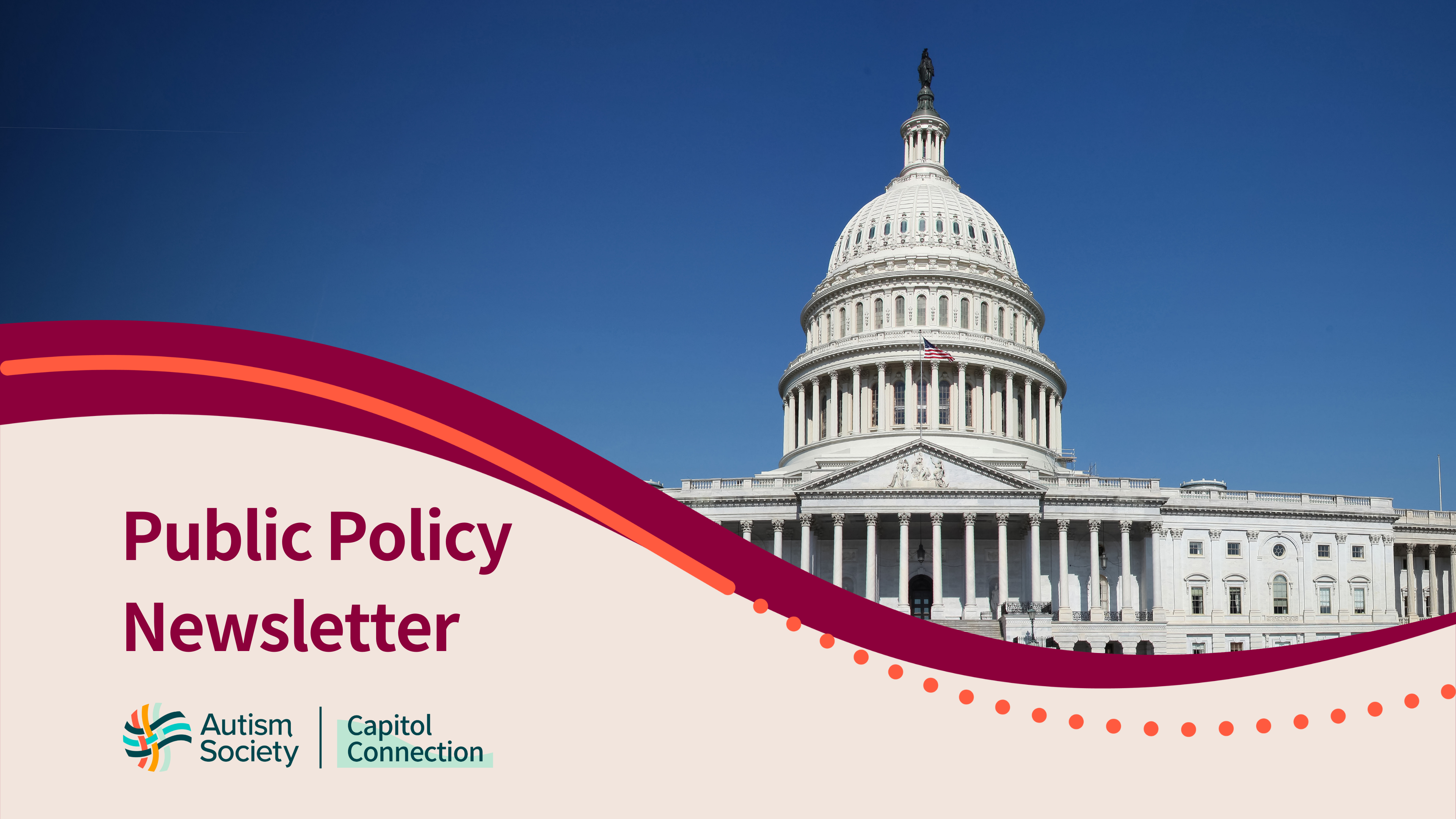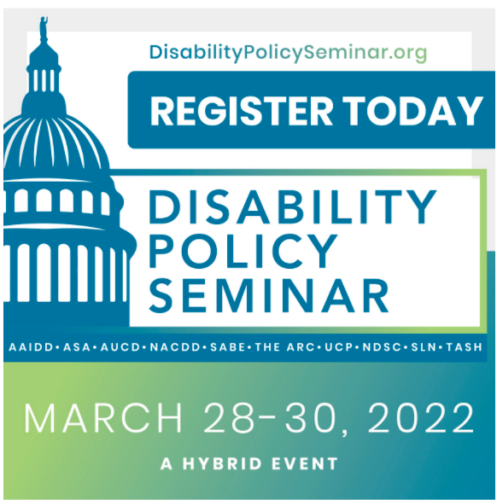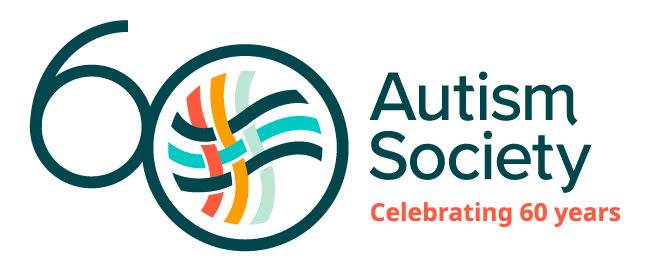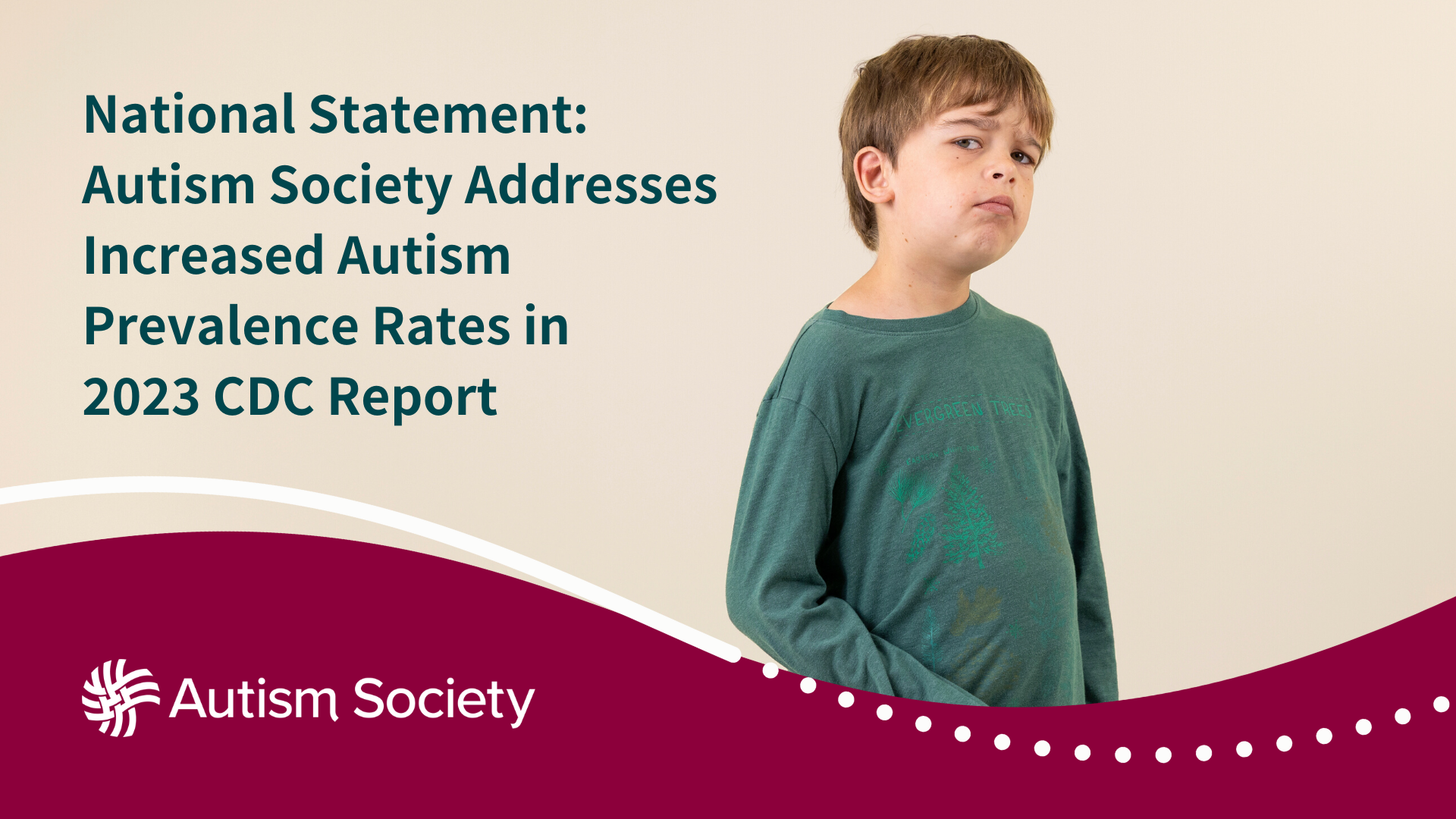
In this issue of Capitol Connection, find information regarding the upcoming Disability Policy Seminar, updates on appropriations, home and community-based services, and education resources. The Autism Society’s Action Center provides easy steps for advocates to educate Congress about these and other issues impacting the Autism community.

Disability Policy Seminar 2022
Registration is open for this year’s Disability Policy Seminar (DPS) taking place in Washington, DC March 28-30, 2022. This year, we’re taking the Disability Policy Seminar to a new level by showcasing the many avenues that advocates could take to engage with their members of Congress! From online meetings to in-person actions, our Day of Action will prepare you with an assortment of tools to choose from when you advocate for issues that matter to you at the local, state, or federal level. These skills will be invaluable as you walk away from the seminar and organize your community to take action toward an equitable future for people with disabilities.
Appropriations
The Continuing Resolution (CR) keeping Federal government programs operating while Congress finalizes the annual appropriations bills expires on February 18. Another short term extension was approved on Tuesday (HR 6617) indicating that negotiators are getting close agreement on an overall top-line funding amount for defense and non-defense discretionary funding. The new short-term CR through March 11 is intended to give Congress enough time to come to agreement on an omnibus spending bill that packages all 12 annual funding bills together. The Autism Society helped to write a letter to House and Senate appropriators urging them to come to an agreement and pass the omnibus spending bill and avoid a year-long CR that would keep much-needed funding increases from becoming law (it will be posted soon). The Autism Society also contributed to and signed a letter from the CCD Education Task Force with a similar message but focussed on education funding.
Home and Community-Based Services
As was noted in the previous issue of Capitol Connection, movement on the Build Back Better Act has stalled. It is unclear if the package of bills will be slimmed down or if the individual bills will have to be moved separately. The Autism Society of America joined in a letter in support of Home and Community-Based Services (HCBS) funding to be included in the Build Back Better Act or any package that may be negotiated going forward. A large investment is essential for building a sustainable HCBS infrastructure that can begin to address the magnitude of need in our communities, both increasing access to Medicaid HCBS and addressing the direct care workforce crisis–creating more direct care jobs to support people with disabilities and aging adults, and making those jobs better. The Autism Society will also continue to advocate for other parts of the package that support people with Autism and other disabilities.
Health
Stop the Wait
On February 3, Representatives Lloyd Doggett (D-TX), Brian Fitzpatrick (R-PA), and Senator Bob Casey (D-PA) introduced the bipartisan Stop the Wait Act. This bill ends the waiting periods during which people with disabilities must wait five months to receive Social Security Disability Insurance cash benefits and two years to receive Medicare benefits. This puts people with disabilities at serious risk of not being able to access health care and facing financial instability. This legislation would ensure that people with disabilities can immediately access the benefits they earned without an unnecessary additional wait (see CCD letter for more on this policy here).
Health Hearing
On February 3rd, the Health Subcommittee of the House Ways and Means Committee held a hearing entitled ‘Bridging Health Equity Gaps for People with Disabilities and Chronic Conditions’. This hearing focused on looking into how the pandemic has exasperated barriers and inequities in the health care system for folks with disabilities. Notable witnesses included Bethany Lilly from The Arc U.S. Lilly focused on barriers such as the two-year waiting period to access Medicare after qualifying for SSDI (see also Stop the Wait Act above) and on access to HCBS. She pointed to the HCBS waitlist of over 800,000 people and how this impacts the health and quality of life. She also pointed out that the extra investment provided by the American Rescue Plan is about to run out and should be extended (see also HCBS article above).
COVID-19 Hearing
On February 8, 2022, the Senate Health, Education, Labor, and Pensions (HELP) Committee held a hearing on “Lessons Learned from COVID-19: Highlighting Innovations, Maximizing Inclusive Practices and Overcoming Barriers to Employment for People with Disabilities.” Witnesses included a researcher, business leader, employment provider, and self-advocate. Issues that came up included technology, accommodations, discrimination, home and community-based services, and subminimum wages. There was bipartisan support for the need to support people in competitive jobs and that hiring people with disabilities is good for business. The public can view the hearing and read the testimony on the committee website.
Education
IDEA Report
The 43rd Annual Report to Congress on the Implementation of the Individuals with Disabilities Education Act (IDEA) was recently released. By law, the Department of Education must release a report annually on the progress that has been made toward ensuring all students have access to a free and appropriate education. This report covered findings from the 2018-2019 school year. Key findings include an increase in the percentage of toddlers from birth to age two served under Part C and that about 97% of these services are provided in a home or community-based setting. The report found that in 2019, 11% of students who qualified for IDEA were under the autism category. This continues the decade long trend of increase, with an overall increase of 1.1 percentage point over the last ten years. It will be interesting to watch for the next two years’ report as the COVID-19 pandemic drastically shifted the education system.
Report on Informal Removal
The National Disability Rights Network recently released a report entitled ‘Out from the Shadows: Informal Removal of Children with Disabilities from Public Schools’ focusing on informal removals students with disabilities face in the schooling system. Informal removals are when the school administration removes students from school for a period of time but are not formally suspended or expelled due to behavior. The Individuals with Disabilities Education Act (IDEA) mandates that students with disabilities receive the necessary services and supports for behavior that they need and that they receive at least the same, high-quality education as other students. The report shares evidence of illegal “informal removals” and makes recommendations to address these practices.
Civil Rights Data
The CCD Education Task Force provided a response to a request from the Department of Education’s Office for Civil Rights (OCR) on the proposed data collection under the Mandatory Civil Rights Data Collection (CRDC) for FY 2021-2022. The CRDC collects data on leading civil rights indicators related to access and barriers to educational opportunity from preschool through 12th grade. The OCR reinserted some survey questions that had been deleted during the previous administration and added a few new questions for the data collection. This data is very important for future policy considerations and will be especially important to ascertain how students with disabilities have fared during over two years of a pandemic.
Civil Rights and COVID
The U.S. Department of Health and Human Services (HHS) Office for Civil Rights (OCR) issued updated guidance making it clear that civil rights protections remain in full force and effect during disasters or emergencies, including the COVID-19 pandemic – PDF. Health care providers covered by Section 504 of the Rehabilitation Act or Section 1557 of the Affordable Care Act may not deny or limit individuals from participating in programs or services on the basis of a disability, the guidance indicates. This can include hospitalization, long-term care, intensive treatments, and critical care as well as the administration of COVID-19 testing, medical supplies, and medication. In addition, officials noted that federal civil rights laws apply to state crisis standard of care plans and other efforts to ration limited resources.
Vaccine Education Initiative
The Autism Society of America launched its Vaccine Education Initiative last week. People with Autism and other developmental disabilities are disproportionately impacted by the ongoing public health emergency caused by COVID-19. The Autism Society of America believes that increasing vaccine confidence is a crucial step towards improving the lives of people with Autism, their families and communities as we all work towards ending the pandemic. Through its Vaccine Education Initiative (VEI), the Autism Society is committed to increasing vaccine education, confidence, and access through grassroots efforts. Find out how how to get involved on the VEI website.
Share:






